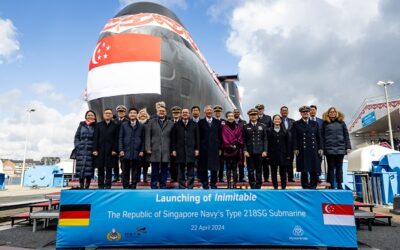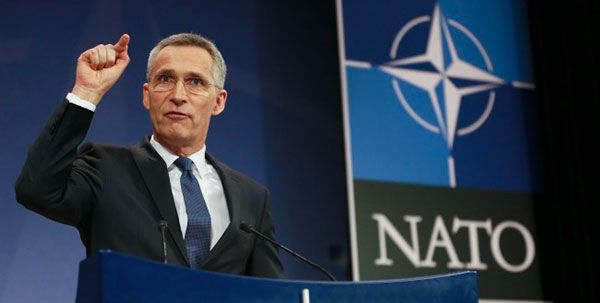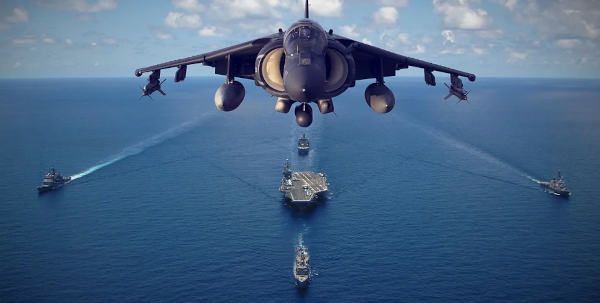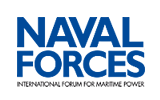EU NAVFOR MED Operational Commander Addresses Shortcomings of EU and NATO in the Mediterranean
At first glance the European Union (EU) Naval Operation to Counter Human Smuggling in the Southern and Central Mediterranean – better known under its operation name SOPHIA – can be described as a success. However, behind the scenes many problems and shortcomings in financing, assets, co-operation and politics hinder the effort. Rear Admiral (UH) Enrico Credendino, Operational Commander for EUNAVFOR MED Operation SOPHIA, addressing experts and scholars at the German Council on Foreign Politics (DGAP) on 5 December in Berlin, stressed that more effort is needed to counter the migrant crisis on the southern route into Europe.
More than 30,000 Lives Saved at Sea
The mere numbers are impressive. More than 30.000 people have been saved at sea by sailors of the mission since summer 2015. At the same time, Admiral Credendino pointed out that SOPHIA is by no means a search and rescue operation, but rather focuses on the disruption of smuggling and human trafficking in the region. “During this time, we have disrupted the business model of the smugglers severely,” he said, “Smugglers cannot leave Libyan territorial waters and therefore have lost a great part of their area of operations”. As many as 352 small vessels have been destroyed and 101 suspected smugglers apprehended by the mission. Yet their criminal activities go mostly unpunished, since Libya’s barely functioning justice system cannot deal with the offenders. Another part of the mandate is the fight against weapons being transported through the southern Mediterranean, particularly from Misrata to Benghazi, fueling the Libyan civil war. Altogether the EU mission accounts for just 13 per cent of the people saved at sea in the region; most of the work is being done by 10 different NGOs or by merchant ships.
Pull-Factor “SOPHIA”?
The number of refugees trying to get to Italy or Malta across the Mediterranean is increasing. After closure of the Balkan route by the deal with Turkey, the southern route accounts for 89% of refugees entering the EU. “We are often accused of being a pull factor for refugees, encouraging them to attempt the passage, because European ships will pick them up,” the Admiral argued in his speech. “But with so many push-factors for migration in the refugees’ home countries on the one hand and the volatile situation in Libya on the other, SOPHIA can hardly be a factor at all.”
Egypt and Turkey as Secondary Issues
During the discussion Credendino estimated the number of refugees waiting for passage in northern Africa at approximately 200,000, mostly in Libya, but with substantial numbers in other countries like Egypt. “We have seen large boats taking off at Alexandria heading for Italy,” the commander explained. In 41 incidents, more than 11,807 people were picked up on this route in 2016 alone. A smaller number of 2,873 people attempted the sea voyage with more sea-worthy boats or yachts from Turkey to Italy. With migration pressure at a historic peak, stronger deterrents for smugglers are required. At the same time, Credendino described the mission’s ties to the Egyptian authorities as “difficult” and their development as an “issue” for his command.
Training the Libyan Coast Guard
Since neither of the missions in theatre is allowed to operate within the national territorial waters of Libya, the EU mission has embarked on an effort to train Libyan coast guard officers. Alongside the training program currently underway, up to 10 patrol boats will be donated by Italy to the 14,000-strong force that Credendino described as, “the most reliable force in the country.” At the same time the security situation is so difficult that no land-based training of the cadets can be organised in Libya itself. The first 78 trainees are therefore currently training for 14 weeks aboard an Italian and a Dutch vessel in theatre.
In a second phase the Libyan officers will undergo land-based training in Greece, Italy or Malta; at the moment, it is still uncertain as to who exactly will finance this stage. A final eight weeks of sea training will conclude the 36-week course. “We are certain that the first 78 handpicked students will have passed the course in spring 2017 and will be able to operate the first two coast guard boats to be handed over in March,” Admiral Credendino said. Furthermore, he has no fear that trainees will change sides in the Libyan conflict, since members of the coast guard have an average two decades of experience. Potential personnel continuities with the former regime would be marginal, the Admiral argued.
NATO Assistance Needed
“We need, we want and we demand much more help from NATO,” Credendino urged. Air assets and surveillance capabilities were highlighted as weaknesses. Relying currently on just three fixed-wing and five rotary-wing aircraft, the mission needs additional ISTAR, MPA, and UAV capabilities to gather information and provide the command and control function with a more accurate picture. The admiral would not comment on the state of his current operational awareness, but mentioned that the mission receives occasional intelligence reports from submarines that are “vital” for the effort and are “highly valued” by his staff. He was reluctant to disclose what nations are involved in these operations and how often he has submarines at his disposal.
More Information Exchange with NATO
Admiral Credendino, who commands the mission from Rome, would appreciate NATO stepping in with further air assets, particularly AWACS aircraft for surveillance, as well as command and control purposes. “A ‘single set of forces’ approach is needed here,” he said. In exchange the Admiral is currently trying to make European information and intelligence available for NATO. An initiative to pass on classified EU information up to a level of “EU Secret” to NATO headquarters or mission assets would be likely “to pass the EU council before Christmas,” he stated. Currently he is only at liberty to share information labeled “EU restricted” or below with NATO.
























